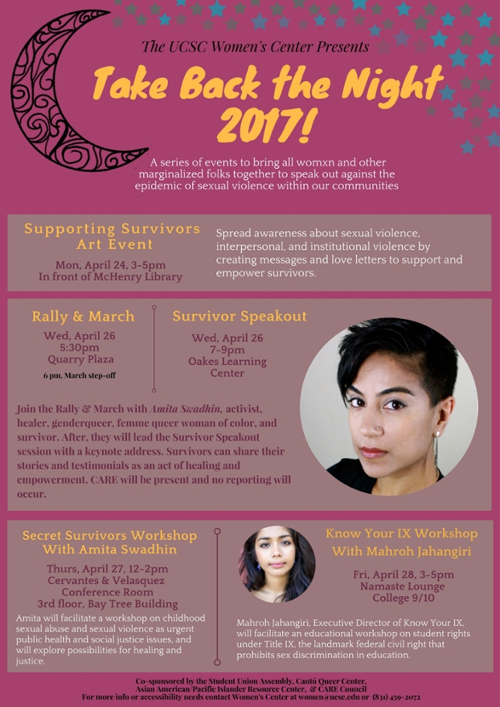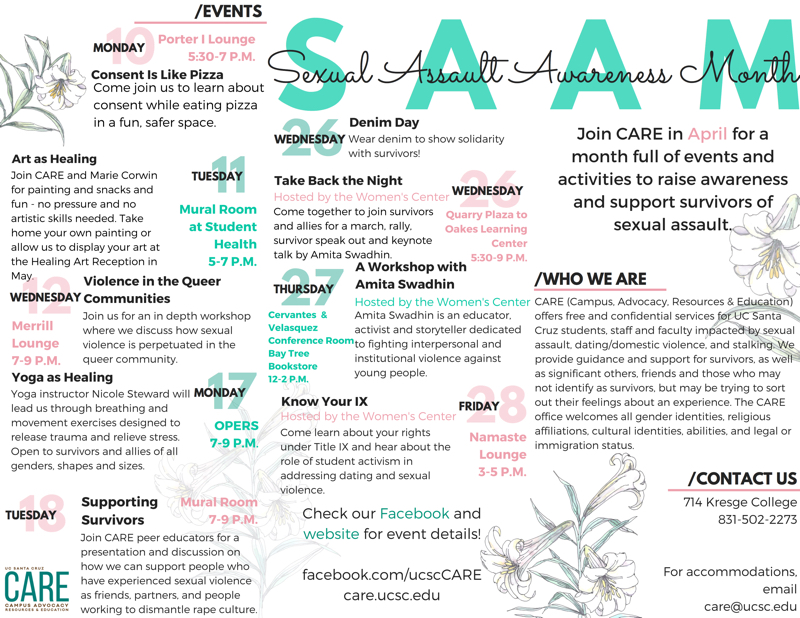Campus News
Students take lead on planning Sexual Assault Awareness Month events
The events for Sexual Assault Awareness Month (SAAM), hosted by several campus offices, include nationally acclaimed speakers, yoga, and art workshops, Title IX Office open houses, a community town hall meeting, and ongoing discussions about sexual violence issues on campus—in addition to a march and rally at the end of the month.




Nearly 40 years after protesters staged the country’s first Take Back the Night marches, students at UC Santa Cruz and other colleges nationwide have expanded the single night of protest to fill the entire month of April with events aimed at raising awareness about sexual violence.
“What’s important about this month and this year, at this school particularly, is that we need to be empowered,” said Morgan Bostic, a student organizer at the Women’s Center. “The university needs to be taking an active role in empowering students to become educated about sexual assaults on their campus and become aware of the methods of changing institutional structures and how to advocate on their behalf.”
Indeed, the events for Sexual Assault Awareness Month (SAAM), hosted by several campus offices, include nationally acclaimed speakers, yoga and art workshops, Title IX Office open houses, a community town hall meeting and ongoing discussions about sexual violence issues on campus—in addition to a march and rally at the end of the month. The greater community is invited to participate.
“The events are really focused on supporting survivors and healing, on education, activism and speaking out,” Bostic said. “We’re trying to have an activist’s trifecta—giving the students all the resources they need to stand up against sexual assault on their campus.”
The busy calendar includes a discussion about consent on Monday, April 10; a painting class on Tuesday, April 11; a workshop on violence in the queer community on Wednesday, April 12; and a community town hall meeting to discuss sexual violence and sexual harassment policy on campus on Thursday, April 13, the latest in a series of ongoing discussions stemming from the campus Beyond Compliance initiative. The town hall is 6–8 p.m. in the Oakes College Learning Center.
In the following weeks, there are workshops on yoga, art and how allies can support survivors, as well as three Title IX Office open houses to be April 18, 19 and 21. The last one is specifically geared to UCSC employees.
Three student-initiated events, sponsored by the Women’s Center, include a Take Back The Night march and rally at 5:30 p.m. on April 26, followed by a Survivor Speak Out with keynote speaker Amita Swadhin, a nationally known activist and survivor.
April 26 is also Denim Day, a way to show solidarity with survivors and emphasize that what you wear has nothing to do with consenting to violence.
“It’s a way to dismantle some of those harmful myths about rape that persist in the culture,” said Emily Crutcher, director of Campus Advocacy, Resources Education (CARE), which is hosting most of the workshops for the month.
“People are really eager to get more involved in some of the policy changes that are happening and are asking, ‘what does that look like for our campus?’” Crutcher said.
Swadhin is also holding a Secret Survivors Workshop on Thursday, April 27, and on Friday, April 28, Mahroh Jahangiri, director of student and survivor-run organization, Know Your IX, will hold a workshop.
Students made the decisions about everything that is hosted by the Women’s Center, said Rebecca Hernandez Rosser, interim director of the Women’s Center and director of the American Indian Resource Center. “They felt, given the campus climate at the time, and really in the nation, that is was important to bring somebody who could speak to their concerns.”
Rosser encourages people to come out not just to hear the speakers but also to engage with students and hear new perspectives from them.
“The events provide opportunities for the community to get a fresh look at what some of these activists are doing and how they’re addressing things,” Rosser said. Although one month is not enough, it boosts the topic in the campus profile, Crutcher said
“The point is to ignite new conversations and initiatives that will change the campus culture,” Crutcher said. “We’re having several exciting events this month, but really, what will sustain the movement is getting students, faculty and staff invested in continuing this work throughout the year.” CARE, she notes, offers a quarterly five-hour, peer educator CARE training for student volunteers.
“The month’s activities are also one way to remind people that they have several options if they experience personally or are aware of some incidents of sexual violence,” said Laura Young-Hinck, Title IX Office response team coordinator. Some people may choose to pursue a formal investigation, others might want to get confidential support and other might just want to learn about the process to help someone else.
“It’s important that people know what resources and options they have to make sure they do what’s right for them,” Young-Hinck said. “If someone makes a report, they will still have control about whether or not they want to continue.” In addition to stopping by the office to ask questions, Young-Hinck invites people to see the new Resources and Reporting Options handout. People can print them or request printed brochures to display on resource tables.
The Title IX office has seen a significant increase in the number of reports over the past three years, but those numbers still represent only a small percentage of the sexual assault and sexual misconduct that is actually happening.
Young-Hinck encourages people to come forward and make reports even if they are not sure about what options they want to pursue or if they are not sure an incident constitutes sexual harassment or sexual violence. The Title IX staff can help clarify incidents and options. Reporting also helps the staff recognize and address patterns of behavior that occur over time. If other people are talking about an incident, people shouldn’t assume that a report of the incident has reached the Title IX office; we need to know about incidents in order to work with campus partners to take action.
“It takes a whole community to create that change,” she said.